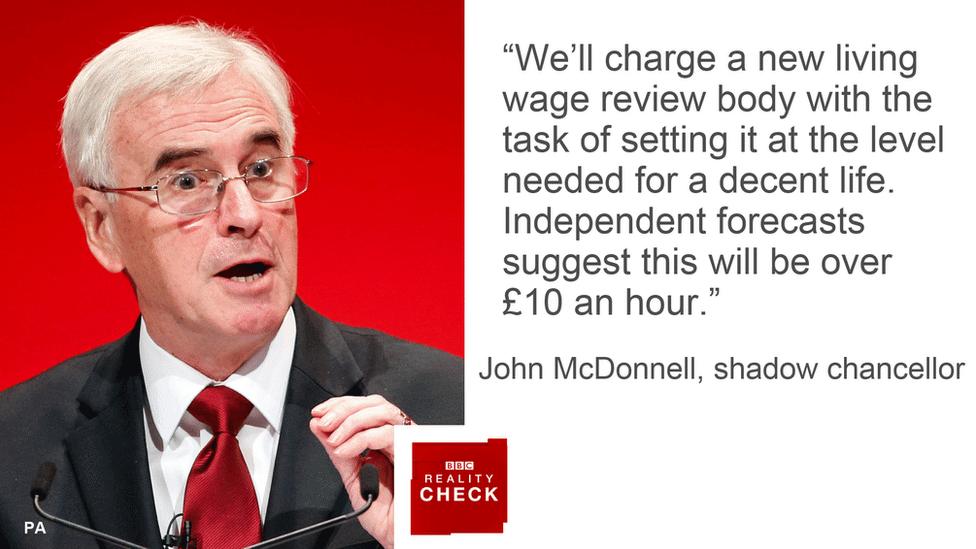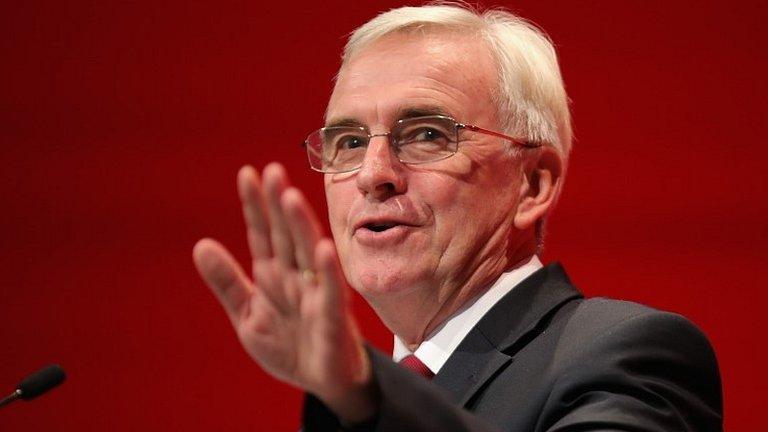Reality Check: Should the minimum wage be more than £10?
- Published

The claim: Independent forecasts suggest that the minimum wage should be more than £10 an hour.
Reality Check verdict: Adjusting cost of living calculations for inflation means that you can get to £10 an hour by the scheduled time of the next election, but there may be an impact on jobs.
In his speech at Labour Party conference, external on Monday, shadow chancellor John McDonnell said: "Under the next Labour government everyone will earn enough to live on.
"We'll charge a new living wage review body with the task of setting it at the level needed for a decent life. Independent forecasts suggest that this will be over £10 an hour."
There has been a certain amount of criticism of this figure, with Jonathan Portes from the National Institute of Economic and Social Research telling BBC News: "John McDonnell has taken George Osborne's made-up number and added some more, so we're seeing a bit of an auction."
George Osborne created the National Living Wage in the July 2015 Budget, which is a new minimum wage for workers over the age of 25.
The target for this wage was that it should reach 60% of median earnings for over-25s by 2020. The median wage is the one you get if you put everyone's salaries in order and take the middle one.
The Low Pay Commission's current estimate is that this means the National Living Wage will be £9.16 an hour by 2020. The current rate is £7.20.
The National Living Wage should not be confused with the figure released by the Living Wage Foundation, which is a body that looks at the cost of living and calculates how much workers would need to earn to fund it.
It is currently £9.40 an hour in London and £8.25 an hour in the rest of the UK.
Mr McDonnell hopes to achieve the £10 minimum wage by 2020. If you take £8.25 an hour and adjust it for the Bank of England's inflation target of 2% a year, you do not get to £10 until 2025 and at the moment inflation is considerably below that level.
But the Living Wage, external is already capped at below the level its researchers believe is the actual minimum living cost outside London. They reckon the figure should be £9.31 an hour, but the researchers have capped it at £8.25 an hour as a result of the "difficult economic times".
If you start from a current figure of £9.31 an hour, inflation takes you over £10 an hour well before 2020.
The important distinction to make is that the Low Pay Commission advises the government on what level of minimum wage may be adopted without adverse effects on employment, whereas the Living Wage Foundation investigates the cost of living.
The Office for Budget Responsibility predicted that there would be between 20,000 and 120,000 fewer people employed by 2020 as a result of the higher target introduced by Mr Osborne.
Paul Johnson, from the Institute for Fiscal Studies, commented: "George Osborne was already taking a pretty significant gamble in increasing the minimum wage to quite such a degree, to a level that's high by international standards and well above what the independent advisers to government suggested was compatible with not losing any jobs or hours."



- Published26 September 2016
- Published26 September 2016
